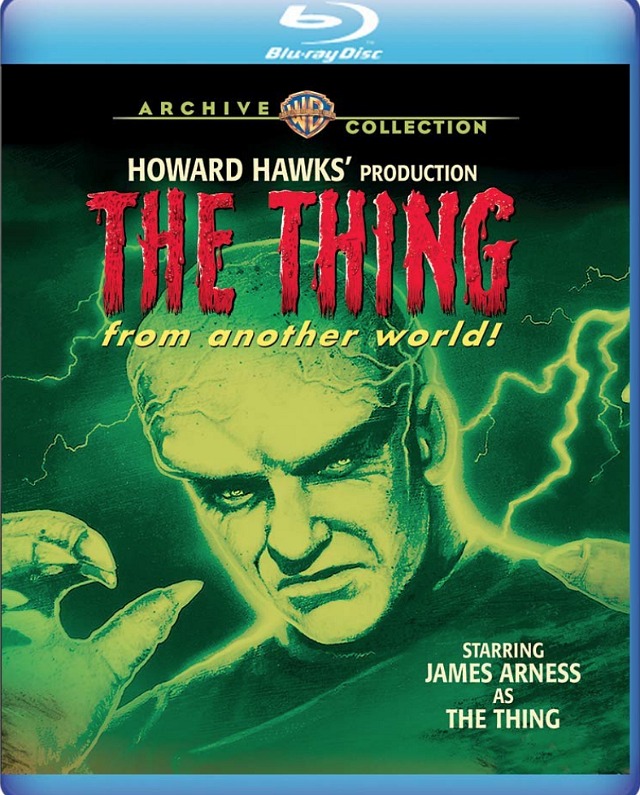Diana Rigg: If you love me, I don’t see what other choice you have.
George C. Scott: What do you mean, ‘if I love you’? I raped you in a suicidal rage. Where did you get love and children all of a sudden?
Rigg: I think I should know if a man loves me or not. You must have told me a hundred times last night. You murmured it, shouted it. One time you opened a window and bellowed it out into the street.
Scott: Well, I think those were more expressions of gratitude than love.
Rigg: Gratitude for what?
Scott: Well, my God, for resurrecting feelings of life in me I thought dead!
Rigg: Well, my God, what do you think love is?
Scott: All right, I love you! And you love me. I’m not about to argue with so relentless a romantic.
MCN Zombie Digs Itself Out of Grave, Staggers Back To Life
With David Poland cruising along and fancy free, Ray Pride has rebooted Movie City News…and it’s not bad! Same old MCN, same headline links, up to date, reasonably on top of things, etc. Ladies, it’s okay with me.

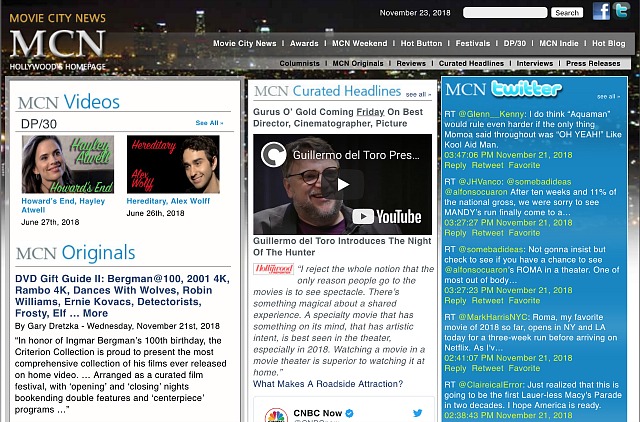
Whole ’19 Shebang
Here’s the latest HE rundown of 2019 films of a certain preferred quality. 88 as we speak. Possible critical faves, perhaps even award-season contenders. The two main categories are (a) general appeal flicks with bigger names and budgets (29), and (b) smarthouse, upmarket films for particular congregations (59). Further refinements to come. What have I missed?
GENERAL APPEAL, BIGGER NAMES, BIGGER BUDGETS. etc. (30)
1. Martin Scorsese‘s The Irishman — A mob hitman recalls his possible involvement with the slaying of Jimmy Hoffa. (Robert De Niro, Al Pacino, Joe Pesci, Jesse Plemons).
2. Quentin Tarantino‘s Once Upon A Time in Hollywood — A faded TV actor and his stunt double embark on an odyssey to make a name for themselves in the film industry during the Helter Skelter reign of terror in 1969 Los Angeles. (Leonardo DiCaprio, Brad Pitt, Margot Robbie).
3. Ang Lee‘s Gemini Man — An over-the-hill hitman faces off against a younger clone of himself. (Will Smith, Clive Owen, Mary Elizabeth Winstead, Benedict Wong).
4. Jon Favreau‘s The Lion King — CGI and live-action re-imagining of the 1994 Disney classic. (Voice-acting by Donald Glover, Alfre Woodard, Chiwetel Ejiofor, Seth Rogen).
5. Todd Phillips’ Joker — Joker origin story, you know the drill. (Joaquin Phoenix, Robert De Niro, Shea Whigham, Zazie Beetz)
6. Marielle Heller‘s You Are My Friend — The story of Fred Rogers, the honored host and creator of the popular children’s television program, Mister Rogers’ Neighborhood. (Tom Hanks, Matthew Rhys, Susan Kelechi Watson, Tammy Blanchard)
7. J.C. Chandor‘s Triple Frontier — Five friends team to take down a South American drug lord. (Charlie Hunnam, Ben Affleck, Pedro Pascal, Oscar Isaac.) Netflix.
8. J.J. Abrams‘ Star Wars: Episode IX — The conclusion of the new ‘Star Wars’ trilogy. (Daisy Ridley, Adam Driver, John Boyega, Oscar Isaac, Lupita Nyong’o, Domhnall Gleeson, Kelly Marie Tran, et.al.)
9. Joe Wright‘s The Woman in the Window — An agoraphobic woman living alone in New York begins spying on her new neighbors only to witness a disturbing act of violence. (Amy Adams, Wyatt Russell, Gary Oldman, Julianne Moore)
10. All You Need Is Love (aka “Untitled Danny Boyle/Richard Curtis Film”) — Set to the music of the Beatles, it’s about a musician who thinks he’s the only one who can hear the Beatles’ music. (Lily James, Ed Sheeran, Ana de Armas, Kate McKinnon, Lamorne Morris) Sheeran plays himself discovering a rising young musician. Mckinnon plays a talent agent. Hamesh Patel costars.
11. Greta Gerwig‘s Little Women — Four sisters come of age in America in the aftermath of the Civil War. (Florence Pugh, Timothée Chalamet, Emma Watson, Saoirse Ronan)
12. James Mangold‘s Ford v. Ferrari — The true story of the battle between Ford and Ferrari to win Le Mans in 1966. (Christian Bale, Matt Damon, Jon Bernthal).
13. Jordan Peele‘s Us — A “social thriller” set between two couples — one white, one black. Starring Winston Duke (Black Panther) and Lupita Nyongo’o — L.A. Daily News critic Bob Strauss champing at the very bit. (Anna Diop, Elisabeth Moss, Kara Hayward)
14. Aaron Schneider‘s Greyhound — During World War II, an international convoy of 37 Allied ships, led by Commander Ernest Krause (Tom Hanks), cross the treacherous North Atlantic while being hotly pursued by wolf packs of German U-boats. (Elisabeth Shue, Karl Glusman, Stephen Graham)
15. Gavin Hood‘s Official Secrets — The true story of a British whistleblower who leaked information to the press about an illegal NSA spy operation designed to push the UN Security Council into sanctioning the 2003 invasion of Iraq. (Matthew Goode, Keira Knightley, Ralph Fiennes)
This Producer Saw “Widows”
CONTAINS MASSIVE SPOILERS: “Saw Widows at Academy last Sunday. Room half empty. Whole cast, producer, director, etc. for the q and a. Half of the room left before they spoke.
“Consensus: Too many plot holes. Big suspension of disbelief of both the Neeson character and the widows arc. Neeson has a passionate relationship with Viola, but we find out he’s sleeping with/in love with some other pasty white chick. Huh? Because their son was half black and was murdered. Her fault? Huh?
“He kills his whole crew, friends and comrades for decades. Huh? Just for the 2 million? He certainly seems talented enough to get it another way. Not believable.
“Question: How did he manage to set up the van explosions without anyone noticing? Put in a life-size dummy in the front seat without anyone noticing? Sneak the satchel of $2 mil by the whole team without anyone noticing?
“More: Do we buy these four women being capable of learning how to pull off a complicated heist in one or two weeks? No. Load and shoot glocks in minutes. No. Etc. etc.
“Additional problems: Robert Duvall overacting. Ouch. Lots of spitting. Way too hammy. Colin Farrell trying to find the way to deal with this in their scenes together. Just struggles. Tough.
“The script was too uneven. Felt like ten different people writing it. Ten different tones. And the flashy technical direction — why are we listening to an entire conversation of people in a car while watching the corner of the hood?” [HE interjection: I loved that shot.]
“It’s all over the place. The script wasn’t ready. Steve McQueen got a great editor, great dp, and his previous work got him terrific actors, but they couldn’t save a plot that had no ground floor.”
Wokey-Pokey
“Green Book has been condemned, in certain circles, as if it were a racially stodgy and unenlightened embarrassment — the Guess Who’s Coming to Dinner of 2018 awards bait. It has been called a white-savior movie — though, in fact, it is not. (The two characters save one another, which is a very different thing.) It’s been condemned for being an overly tidy fable that takes refuge in the ‘safe’ world of the past.
“But really, what is the movie’s crime? It’s based on a true story, which it tells with considerable depth. It’s not trying to make a grand statement about race except for the idea that white people and black people, to the extent that their backgrounds and experiences separate them, should try to understand each other better. Sorry, but I must have missed the place where that became a reactionary message.” — from Owen Gleiberman‘s “Is Green Book Woke Enough? Does It Need to Be?,” posted on 11.22.18.
I don’t know how successful the attempted torpedo campaign by the wokers and their journalistic supporters will be in the end, but the viciousness of the Green Book volleys hasn’t been matched since the “don’t vote for Zero Dark Thirty because it endorses torture” campaign of 2012 and early ’13, which I called “The Ugliest Takedown in Oscar History.”
Animation Is Animation
I saw Disney’s 1994 animated-cartoon Lion King (decent enough but calm down), and then I took the kids to see the Lion King Broadway musical sometime in the spring or summer of ’98 (okay but enough already). Now I’m supposed to get excited 20 years later over yet another version of the ’94 original because the CG animation techniques are live-actiony?
The family crowd will pour into the plexes, but the “lion cub destined to be king of the animals gets banished by his evil uncle” story has always been ridiculous. Lions are predators who are out to fill their bellies so why the hell should various African species bow down to a killing beast who would just as soon eat them as look at them? Bambi made some kind of sense — this doesn’t.
Yeah, yeah…I get it. This is a movie about proud African heritage and manifest destiny — a talking-animal version of Black Panther.
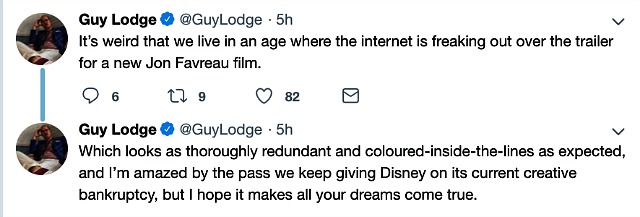
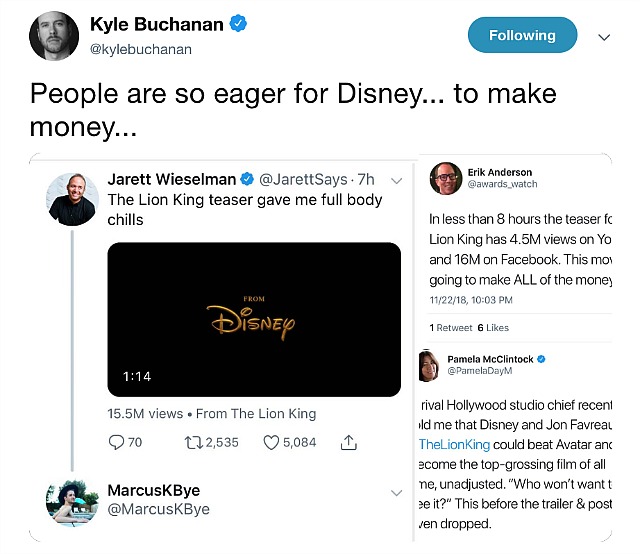
Grandma Missing The Point
When I watch Cary Grant in North by Northwest I’m always aware this was his crowning big-screen moment of the ’50s, his last great role and the last film in which he could make a case for looking late 40ish and perhaps a suitable sexual partner for Eva Marie Saint (he was 54 when Alfred Hitchcock shot NXNW in ’58 — she was 34), and after this he was more and more the silver fox and starting to go gently downhill with grace and elegance (nobody believed he was an appropriate romantic match for Audrey Hepburn in Charade) but heading there regardless, and of course destined to retire by the mid ’60s. So North by Northwest was really the last shining moment of his career…the last VistaVision moment when everything was truly in place.

Look, It’s Simple…
The best part of Thanksgiving Day is the morning. Chilling in the den or kitchen, that warmish snug feeling (it’s 18 degrees outside as I speak), a coffee or a hot chocolate with a spritz of whipped cream, writing or web surfing, awesome aromas from the kitchen, “Back Street Girl” or one of Bernard Herrmann‘s scores on the Sonos. It doesn’t get much better than this.
Then you leave for the gathering or the gathering comes to you and it’s like “okay, here we go.” Entirely pleasant blah-dee-blah blah. You have to tell yourself not to look at the phone. Then you have to say “no” to nearly everything, to this or that serving or portion size or creamy, gleaming, gravy-covered whatever. The aromas are the best but the food…better to pass. Just say “no,” “no, thanks,” “no, thank you” and “Oh, that looks magnificent but maybe later.” And ignore anyone who likes Trump. Slip into the bathroom to check the phone. Take a walk after dinner. Pretend to watch the football game but focus on your phone. And after four or five hours, guests are allowed to go home.
Light Switch On The Wall
Tragedy this day, 55 years ago. The brutal kind, to put it mildly. Instant cut-to-black at age 46. At least it was quick.
People who make it into their graying, neck-wattled, bent-over years experience a hundred or a thousand signals a day that say “things are slowing down, you’re becoming a bit more vulnerable, your gleaming years are behind you, it’s all downhill from here on, life can be dull and dispiriting, time for a nap,” etc. I sensed that resignation every time I visited my parents in their assisted living facility.
I guess I’m saying in a very narrow way that there might be a very slight upside in being spared all that, and in making a fast, decisive, sudden exit when the sky is blue and you’ve got a full head of hair and millions in the bank…wham.
You’re here and then you’re not here. Then you’re somewhere else…maybe.
That being said, all hail Kirk Douglas and Norman Lloyd! God, forgive me — I just used an exclamation point.
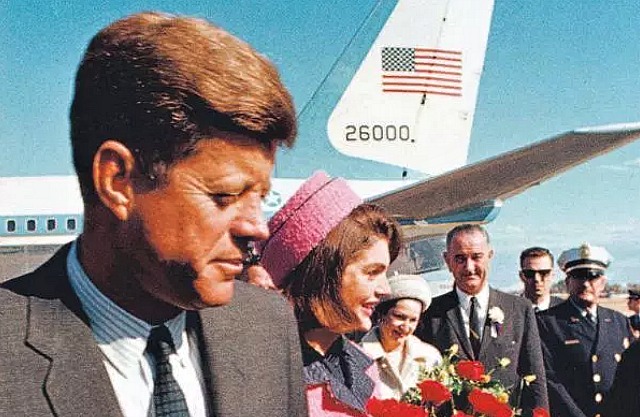
“Thing” Interruption
DATE: 11.22.18
FROM: Jeffrey Wells, Hollywood Elsewhere
TO George Feltenstein, SP VP of Theatrical Catalog Marketing, Warner Bros. Home Entertainment
RE: Warner Archives Bluray of The Thing From Another World (’51)
George,
Can you please convey what’s happening with Warner Archive’s forthcoming Bluray of The Thing From Another World? There seem to be delays.
I ordered it a couple of weeks ago on Amazon. I know I did! But now there’s no record of the order.

The Thing‘s Amazon page now says “currently unavailable…we don’t know when or if this item will be in stock.”
Jeffrey Wells, Hollywood Elsewhere
Feltenstein reply: “There is no official street date at the present time for The Thing From Another World due to an industry-wide replication capacity problem. People are working diligently to get things back on track ASAP and we apologize for any confusion. Once we know of a concrete street date we will let all know through all possible channels (including right here). Rest assured
“To be clear, this situation is more complex than the usual supply/demand issue, and it has created many problematic delays for a large amount of releases from many different companies.
“I believe the issue is now being rectified, and I have seen online posts on various forums from consumers acknowledging they have are receiving notices from Amazon that their orders will be arriving next week, and I expect their product page will be re-activated accordingly.”
